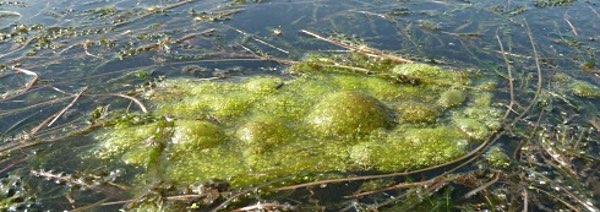- By Dan Veaner
- News
 Print
Print 
The swim area at Myers Park is due to close August 20th. Lansing swimmers were lucky this year, because many swim areas around Cayuga Lake closed early due to sightings of blue-green algae, a Harmful Algal Bloom (HAB) that releases harmful toxins. The Tompkins County Health Department (TCHD) issued a warning at the beginning of this month, with a plea for observers to report any sightings of HABs that could take the form of floating mats, scum, or just discolored water.
"We dodged the bullet on blue-green algae," Park Superintendent and Recreation Director Steve Colt told the Lansing Town Board Wednesday. "Other places had it. Our location, relative to the wind and the wave action, didn't get it. I called the Health Department several times on suspicion. Each call they said, 'No, thanks for calling. You don't have it. Carry on.'
Cayuga Lake has had HABs reported in the past. it was on a DEC notification list for seven weeks last year with reports coming from Cayuga, Seneca, and Tompkins Counties between mid-August and early October. Seneca County reported the bloom on Cayuga Lake over the course of three weeks in 2014.
TCHD cautioned swimmers to seek immediate medical help if they came in contact with the algae. Their warning noted that nausea; vomiting; skin, eye, or throat irritation; diarrhea; allergic reactions; and breathing difficulties might result from touching HABs. Health Department officials said they were working closely with bathing beach operators.
"Most algae are harmless and are an important part of the food web," explains a DEC Web page. "Certain types of algae can grow quickly and form blooms, which can cover all or portions of a lake. Even large blooms are not necessarily harmful. However some species of algae can produce toxins that can be harmful to people and animals. Blooms of algal species that can produce toxins are referred to as harmful algal blooms (HABs). HABs usually occur in nutrient-rich waters, particularly during hot, calm weather."
Colt compiled a booklet to help all the lifeguards on his staff to identify the algae and instructed them to check daily.
"We had eyes out there every day," he said. "We also took a lot of phone calls, because other places on the lake were closed."
Colt noted that the August 20th closing date is normal for Myers Park.
"A lot of places close then. You start losing your lifeguards to college. A lot of the lifeguards are athletes and scholastic athletics started Monday. It starts to get really tough to staff it, and you're required to staff your swim area at certain minimums any time it's open."
v13i32




